I’m back at my animal cake series with this adorable crab birthday cake!
This cake is made with tender red velvet cake layers and buttercream frosting. It’s just as delicious as it is cute.
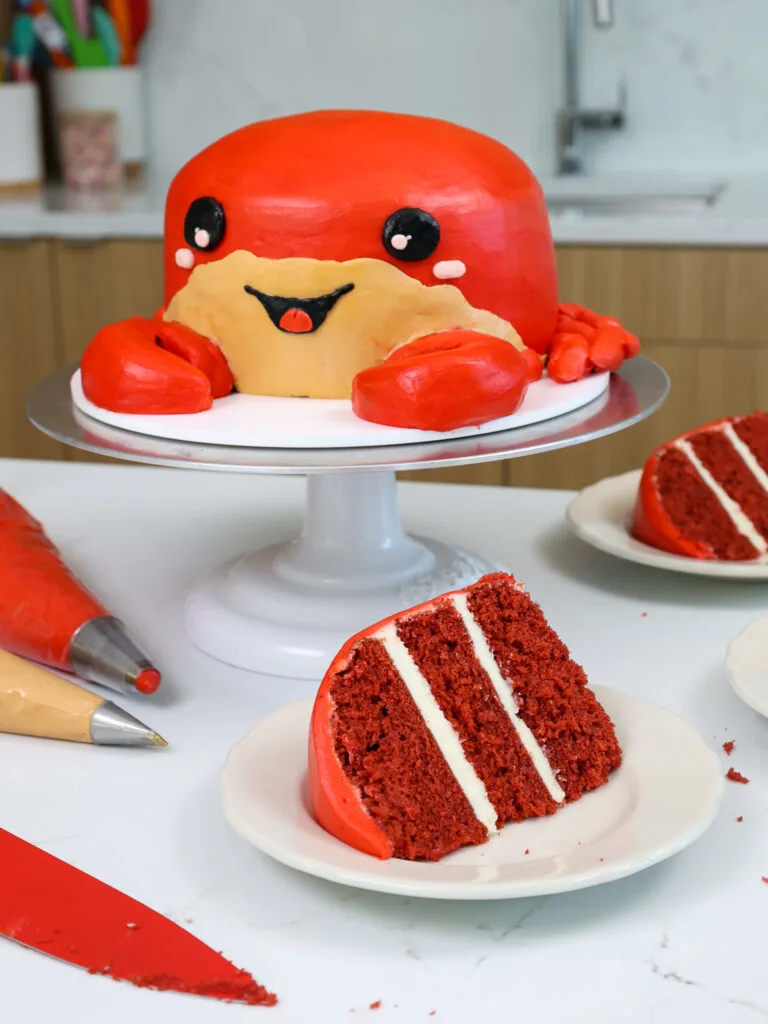
Making this Crab Cake: Step-by-Step Tutorial
Let’s walk through each step of this cake together to make sure it turns out as amazing as possible! I’ve shared a video below, or you can check out my in-depth video tutorial on my YouTube channel.
I figured it might be helpful to know what tools I use too, so I’ve shared a list below.
Not all of these are mandatory, but they make the process a lot easier. If you don’t have all these things on hand, feel free to improvise and work with what you have.
- 3, 7-inch or 8-inch Cake Pans
- Spinning Cake Stand
- 10-inch Cake Board
- Small Offset Spatula
- 3 Small Piping Bags
- 1 Large Piping Bag
- 1 Frosting Coupler
- 2 Small Round Piping Tips (like a Wilton 10)
- 1 Very Small Round Piping Tip (like a Wilton 2)
- Small Flat Piping Tip (like an Ateco 48)
- Large Round Piping Tip (like a Wilton 1A)
- Small Acetate Sheet (I cut these down into smaller squares with scissors)
- Electric hand mixer or stand mixer
Step 1: Bake the Red Velvet Cake Layers
First, we set to work on the cake layers. Line three, 7-inch round cake pans with parchment rounds and grease with non-stick baking spray or homemade cake release.
Divide the batter evenly between the cake pans and bake for 27-30 minutes.
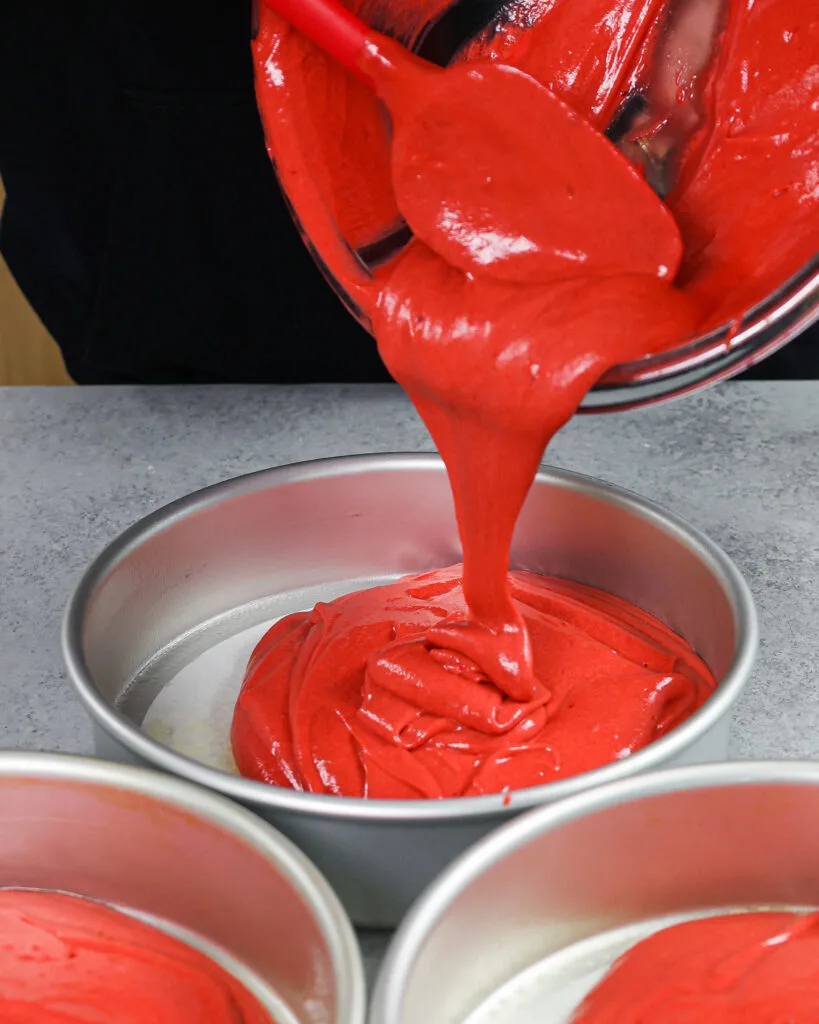
Let the layers cool for 10 minutes, then run an offset spatula around the perimeter of the pan to separate the cake from the pan.
Flip the cake layers onto a wire rack to finish cooling.
Level two of the cake layers with a serrated knife once they’re fully cooled. Leave one of the cake layers with a rounded top. Trim the top of the rounded cake layer to give it a domed shape like in the pictures above.
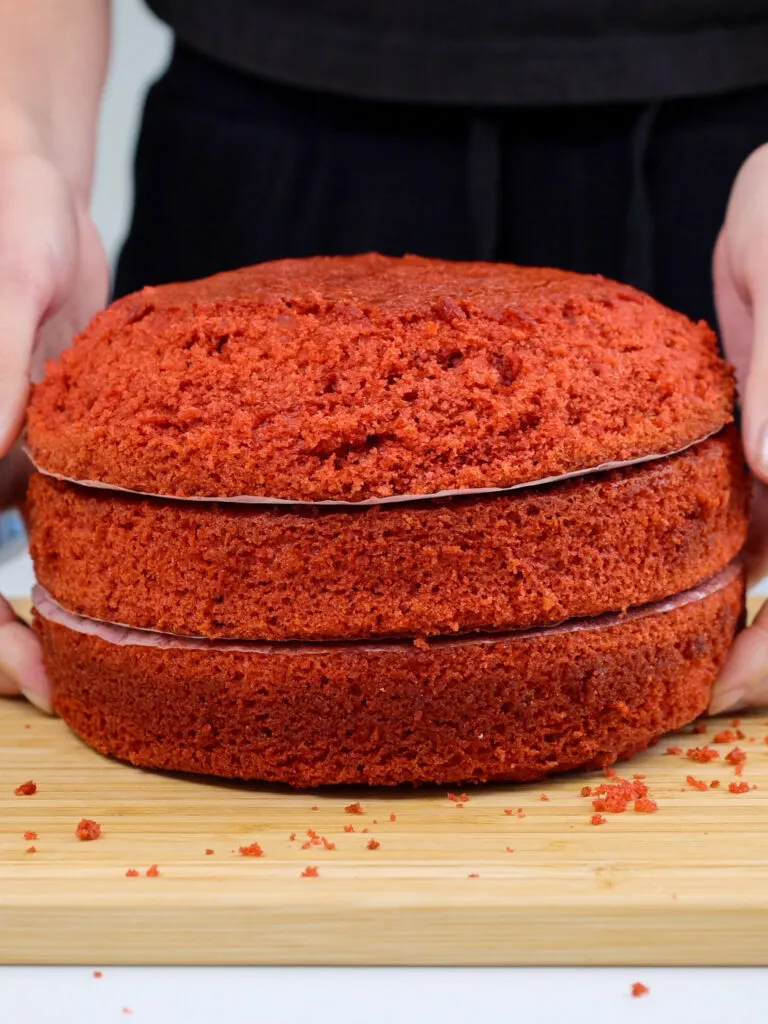
Place the cake tops and cake trimmings in a bowl and cover with plastic wrap and set aside. We will use this later to make our crab’s claws!
If you make these in advance, wrap and freeze them at this point. Take them out of the freezer about 20 minutes before you want to assemble the cake.
Step 2: Make the Buttercream Frosting
Next, we work on the buttercream frosting. I chose to make this cake with regular vanilla buttercream, but you can use cream cheese buttercream if you want!
I find regular buttercream is easier to smooth, which is why I chose to use it for this design.
If the frosting seems too thick after mixing all the ingredients, add in additional heavy cream or milk (1 tablespoon at a time). Or if the frosting is too thin, add in more powdered sugar (1/4 cup at a time).
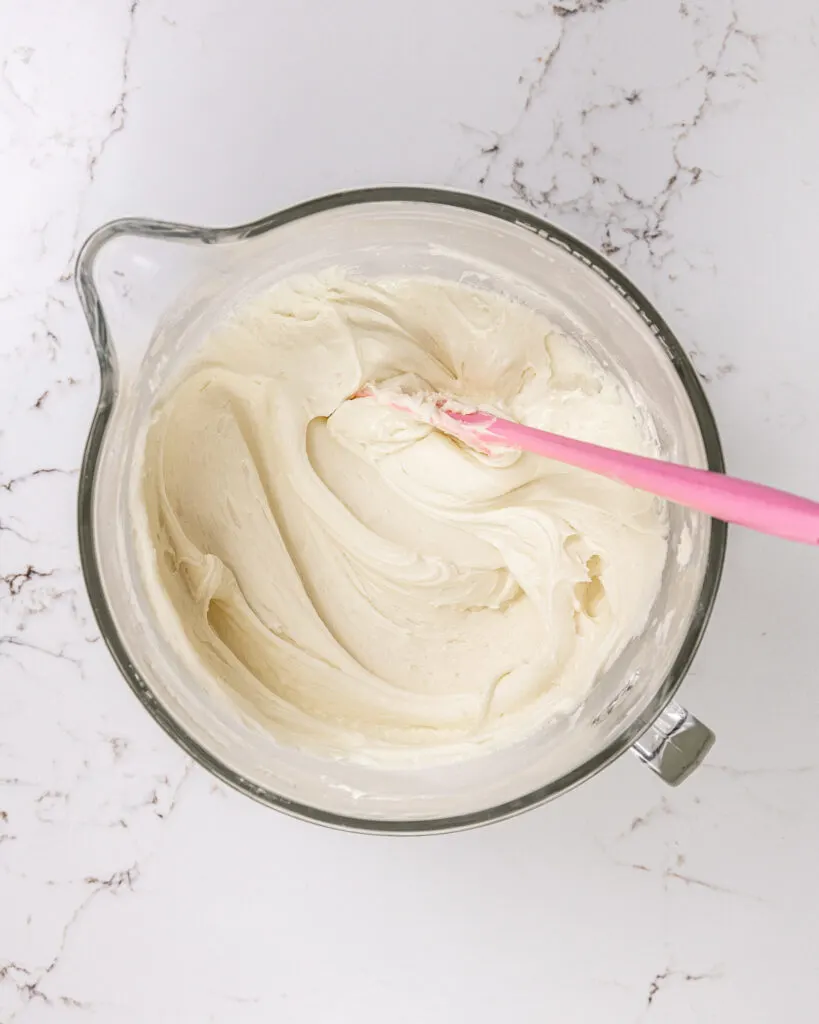
If you’re unsure how thick your frosting should be, you can learn what consistency you’re looking for in my frosting consistency post.
Wait to color the frosting until we’ve crumb coated the cake. Cover the frosting flush with plastic wrap and set aside.
Step #3: Stack and Frost the Cake Layers
Stack and frost the cake layers on a greaseproof cake board using a dab of frosting to help stick the first cake layer to the board. Stack the layers off-center so that you have room to add the crab’s claws in front of the cake.
Use one of the leveled cake layers first and spread an even layer of frosting on top of it. Add the other leveled cake layer next and add on an even layer of frosting. Top it with the rounded cake layer. Stacking the cake layers in this order should give our crab a nice, rounded shape.
Chill the cake for about 10 minutes in the freezer. This will help the buttercream between the cake layers firm up and make the cake easier to frost.
Spread a thin coat of frosting around the cake that fully covers the cake layers. Smooth using an offset spatula or small acetate sheet.
Add a couple teaspoons of buttercream into the bowl with the cake top we set aside earlier.
Stir the mixture with a fork until the it’s fully combined and has a consistency similar to cake pops. It should be easy to handle and shape.
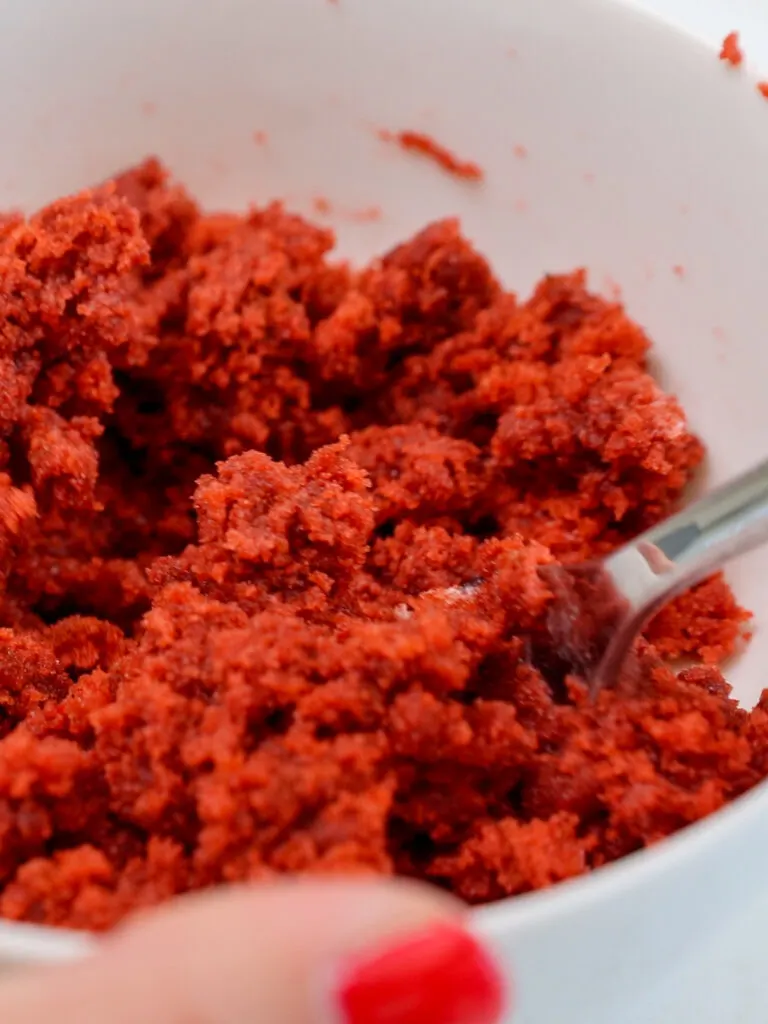
Use the cake top mixture we made earlier to shape 2 claws. Mine were 1 1/2-inches wide and 2-inches long.
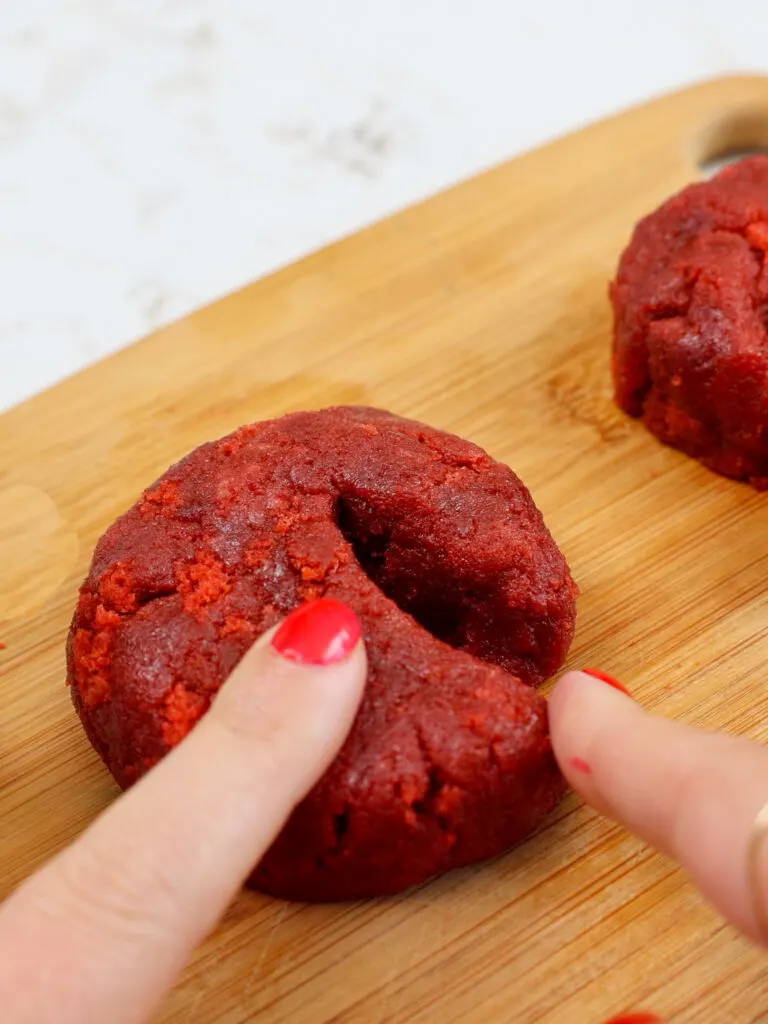
Place them in front of the cake, then chill the cake in the fridge (20 minutes) or freezer (5 minutes) until the frosting is firm to the touch. This makes it easier to get a perfect second coat of frosting.

Step 4: Color the Buttercream
While the cake chills, color the buttercream! It’s going to sound crazy, but all the frosting can be colored in one bowl. We start with the lightest colors and work our way to the darkest, so it works out great!
Scoop 1/2 cup of buttercream into a small bowl and make it a tan color with a small drop of yellow and brown gel food coloring to make our crab’s tummy. Place in a small piping bag fit with a flat piping tip (like an Ateco 48) and set aside.
Color 2 Tbsp of buttercream a light pink using a very small drop of red gel food coloring to make the cheeks and bright spots in our crab’s eyes. Place in a small piping bag fit with a small round piping tip (like a Wilton 10) and set aside.
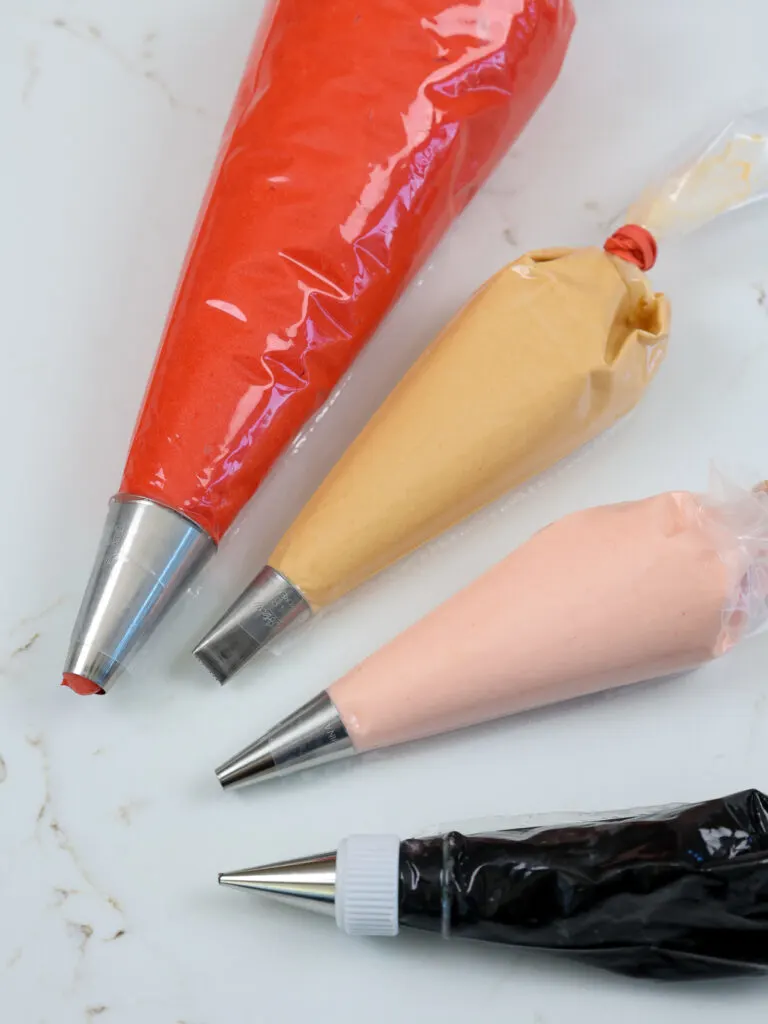
Color 3 Tbsp of buttercream black using a very generous squirt of black gel food coloring. Place in a small piping bag fit with a coupler and round piping tip (like a Wilton 10) and set aside. This will be used to make the crab’s eyes and mouth.
Color the remaining buttercream red with red gel food coloring. Place in a large piping bag fit with a large round piping tip or cut with an opening about 3/4 inch wide and set aside.
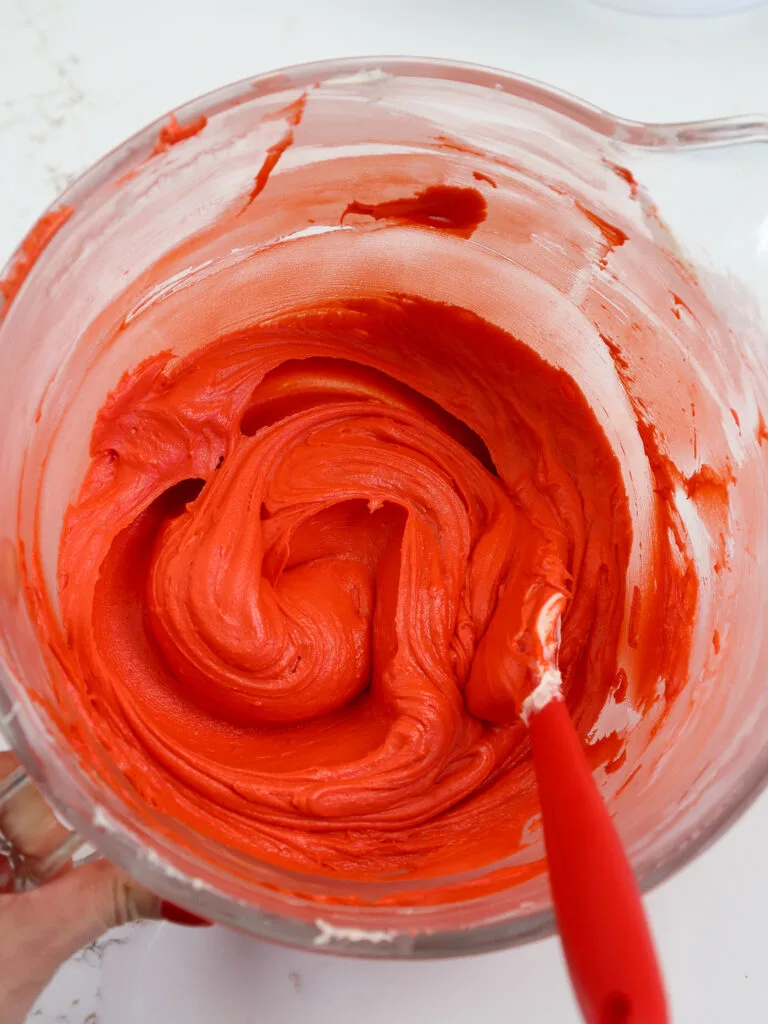
If you’re struggling to make super red frosting, I share a bunch of helpful tips in my red buttercream tutorial.
Step 5: Frost and Decorate this Crab Birthday Cake
Cover the cake and claws in a thick layer of red buttercream. Make sure you save some buttercream to pipe our crab’s legs later! Smooth using an offset spatula and acetate sheet. Chill the cake until the frosting is firm to the touch.
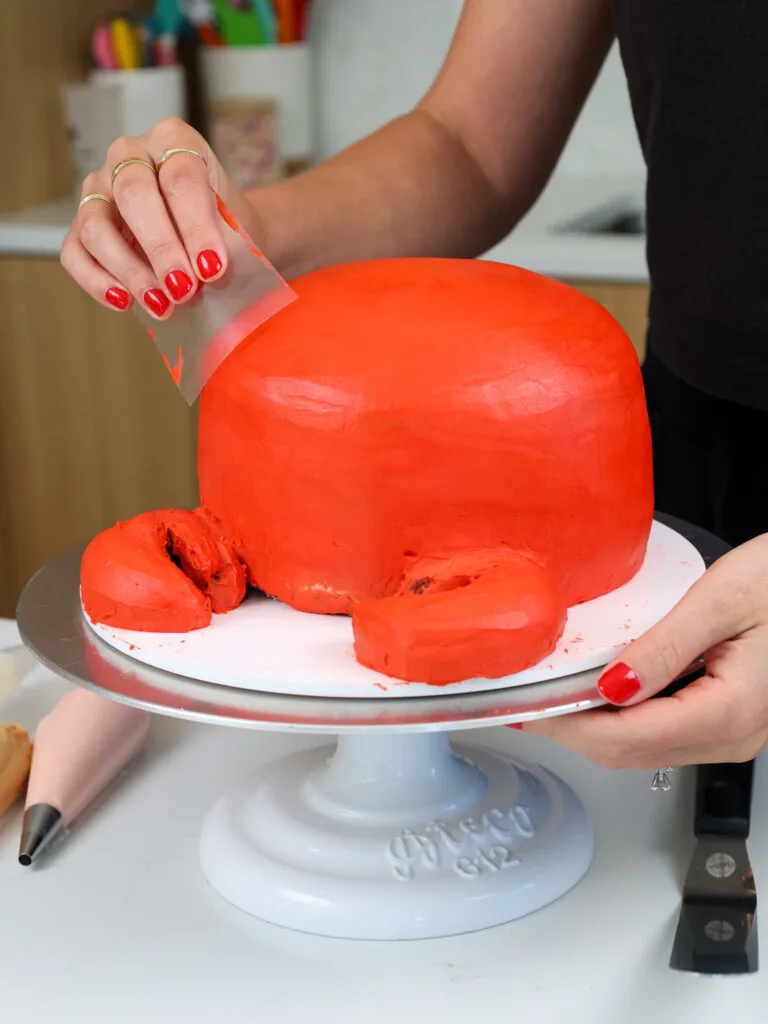
And then it’s onto the piping! Pipe on the crab’s underbelly first with the tan buttercream. Smooth using a small offset spatula or acetate sheet.
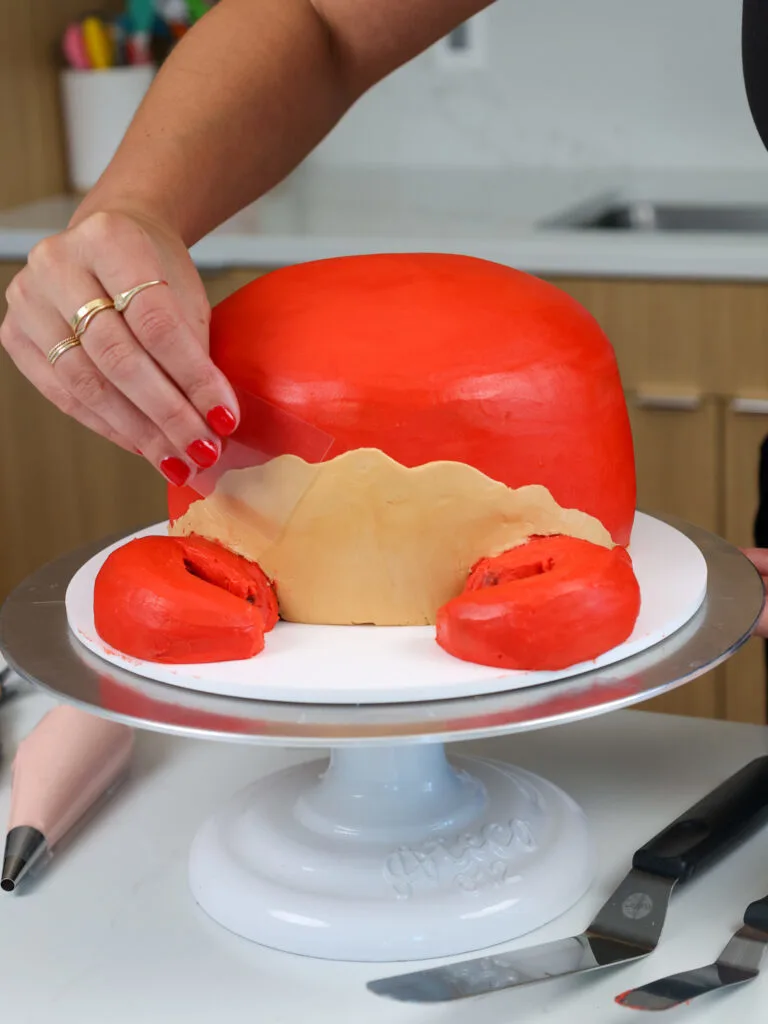
Next, pipe on the crab’s back legs using the red buttercream. Add four legs on each side of the cake behind the claws.
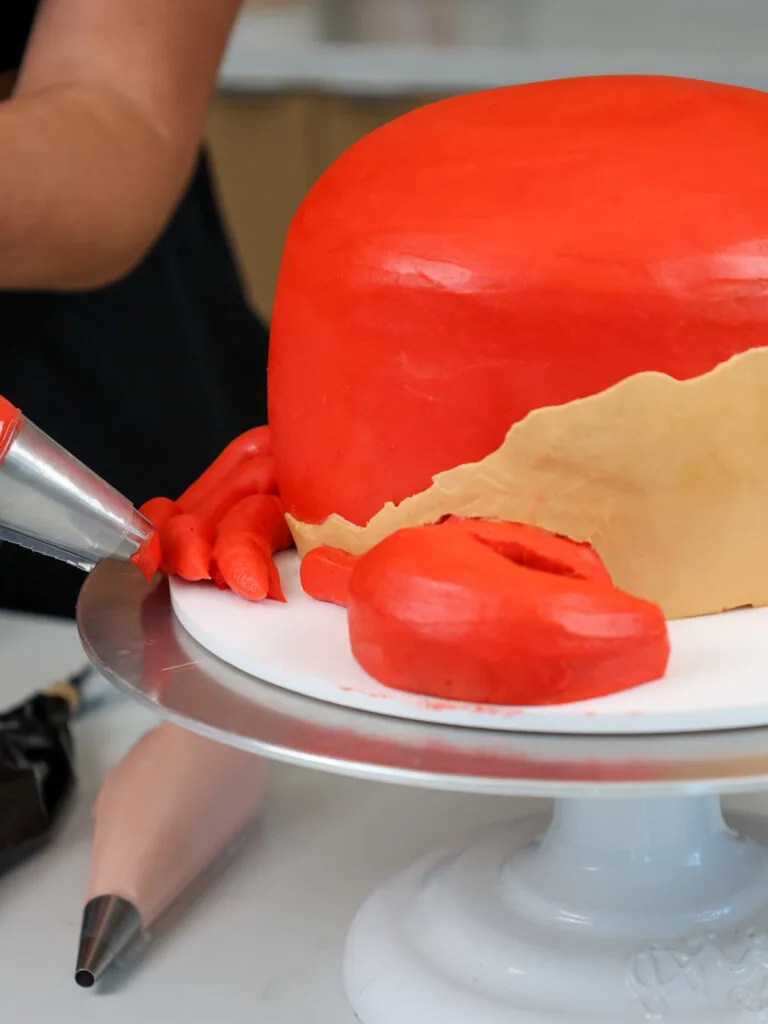
Then it’s time to sketch out our crab’s face. Use an offset spatula or butter knife to trace out where the eyes, mouth, and cheeks should go.

Use the black buttercream pipe on the crab’s eyes and mouth. I used a Wilton 10 tip to pipe the crab’s eyes, then switched the piping tip for a very small round tip (Wilton 2) to make the crab’s mouth.
The last step is to use the light pink buttercream to pipe on the crab’s cheeks and the little spots in its eyes.
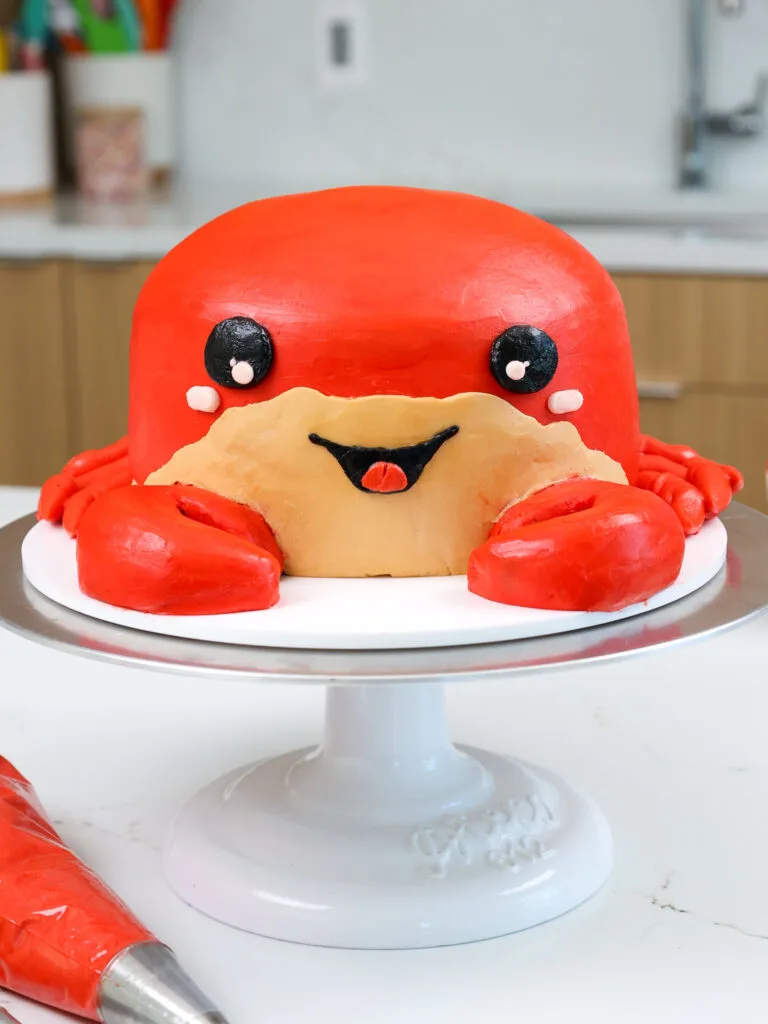
This gives it a bit more dimension and makes it look even cuter. Then enjoy!
Crab Cake Substitutions and Swaps
Below are some swaps and substitutions that can be made in this recipe.
- Cake Flour – This recipe turns out best with cake flour, but you can use a gluten free flour blend if that’s all you have on hand. Or if you can’t find cake flour you can make your own using this technique.
- Granulated Sugar – I do not recommend reducing the amount of sugar or changing the type of sugar, as it will change the texture of the cake layers.
- Unsalted Butter – If you only have salted butter on hand, you can use it in place of the unsalted butter in this recipe. Just be sure to omit the salt that this cake recipe calls for. You can also use vegan butter in its place (and also omit the salt)!
- Eggs – If you have an egg allergy you can try using flaxseed eggs or an egg replacer but it will affect the texture of the layers.
- Buttermilk – You can also use full fat yogurt, sour cream, whole milk, or an alternative yogurt or milk (almond, soy, oat) if you’re dairy free.
- Vegetable Oil – You can use any flavorless oil in this recipe. Canola or even sunflower oil would work great!
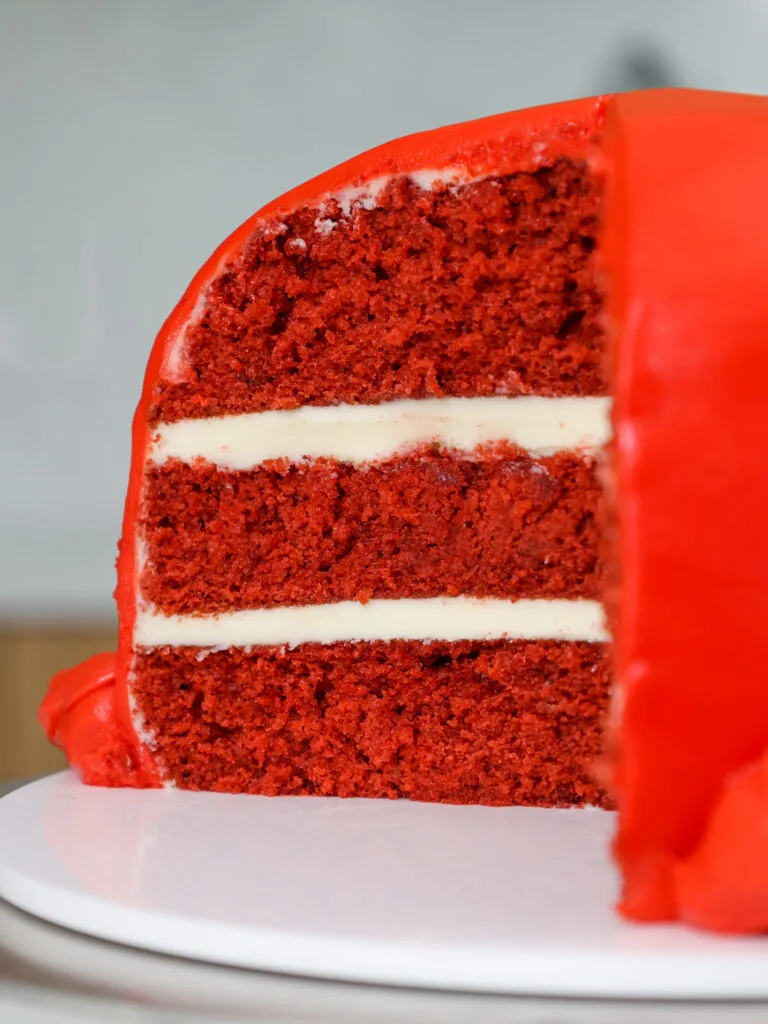
Buttercream Frosting Substitutions and Swaps
- Unsalted Butter – If you only have salted butter on hand, you can use it in place of the unsalted butter. Just be sure to omit the salt that this frosting recipe calls for. You can also use vegan butter in its place (and omit the salt)!
- Heavy Cream – Whole milk or alternative milk (soy, almond, oat) will work fine in this frosting recipe if that’s what you have on hand.
- Gel food coloring – Natural food coloring (like raspberry powder) or liquid food coloring can be used if needed.
Making This Crab Cake in Advance & Storage Tips
Make your cake layers in advance and freeze them. It breaks the process up and makes it more approachable.
Make your frosting ahead of time or save any leftover frosting! It can be stored in an airtight container in the fridge for up to a month, or in the freezer for up to 3 months. Be sure to give it a good stir once it thaws to get the consistency nice and smooth again.
A frosted cake can last in the fridge for up to a week or in the freezer for up to a month. The buttercream locks in all the moisture, keeping the cake fresh and delicious!
If you cut into the cake and have leftovers, use any remaining frosting to cover the cut section to keep it moist and store in the fridge for up to a week.
Tips for Making the Best Crab Cake
- Use gel food coloring to color the buttercream. Liquid food coloring can throw off the consistency of the frosting and won’t make as vibrant of a color.
- Ingredients at room temp mix together better! Set out any cold ingredients ahead of time.
- Properly measure your flour (spoon into the cup measure, then level) or use a kitchen scale to measure the dry ingredients.
- Use an acetate sheet to make the frosting super smooth.
- Make this crab birthday cake vegan or dairy free if needed! Use your favorite type of dairy free milk to replace the buttermilk and heavy cream and use vegan butter sticks in place of the butter. For the eggs I recommend using an egg replacer like this.
- If you’re having a hard time making bright red frosting, check out my red buttercream tutorial.
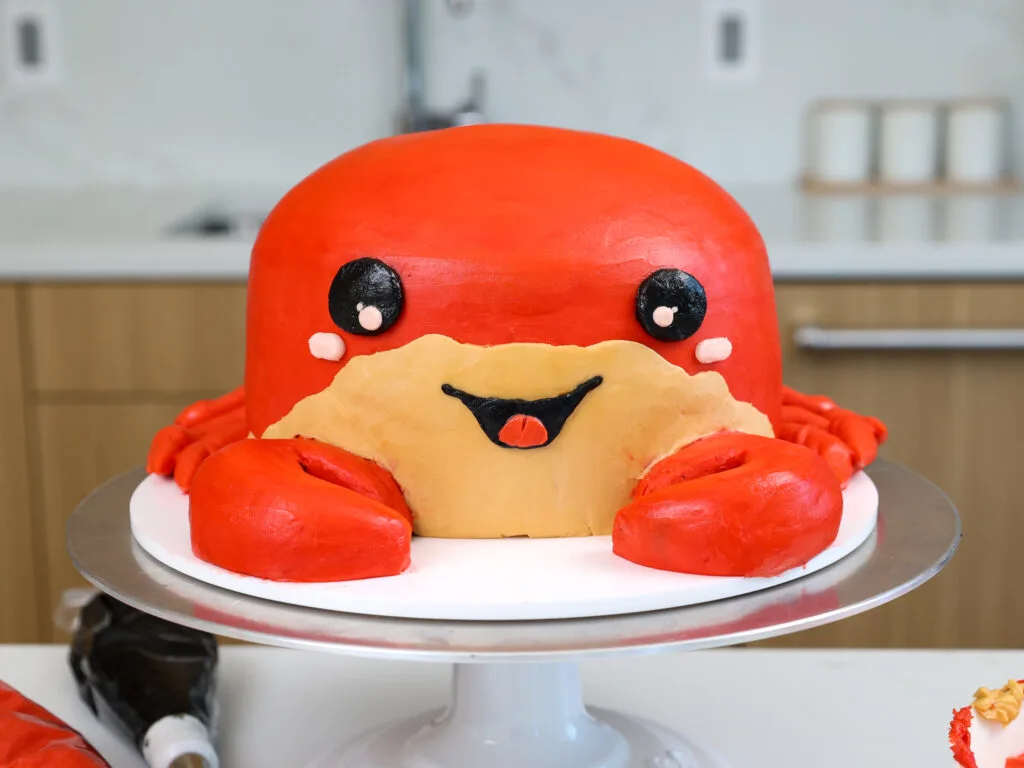
Let Me Know What You Think!
If you make this crab birthday cake, I’d love to hear what you think! Let me know by leaving a rating below.
If you plan to share on social media, you can tag me @chelsweets and #chelsweets so that I can see your amazing creations on social media.
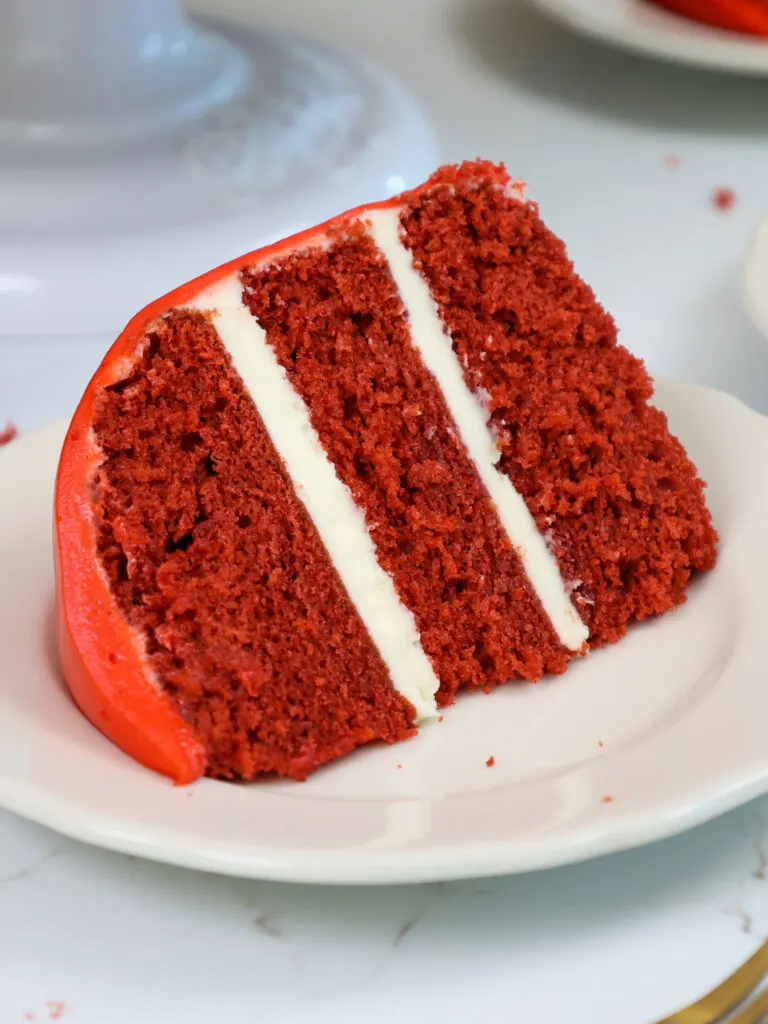
Other Recipes You Might Like:
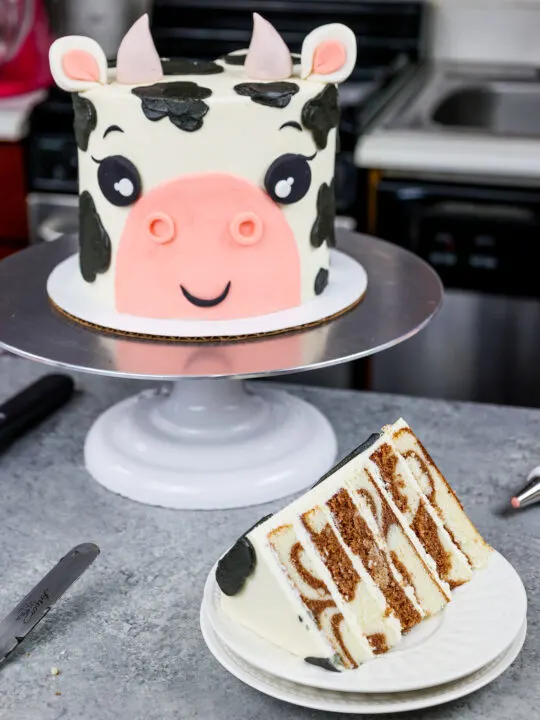
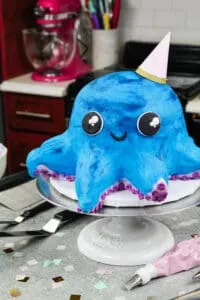
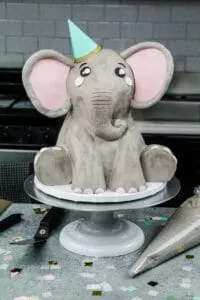
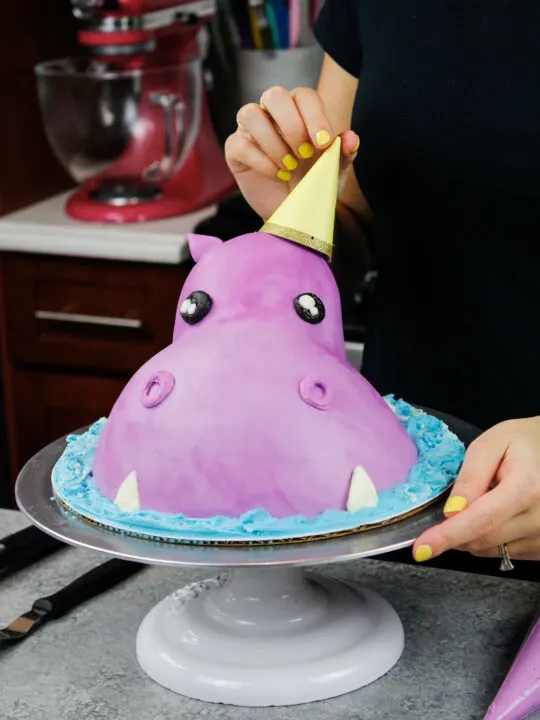
Crab Birthday Cake
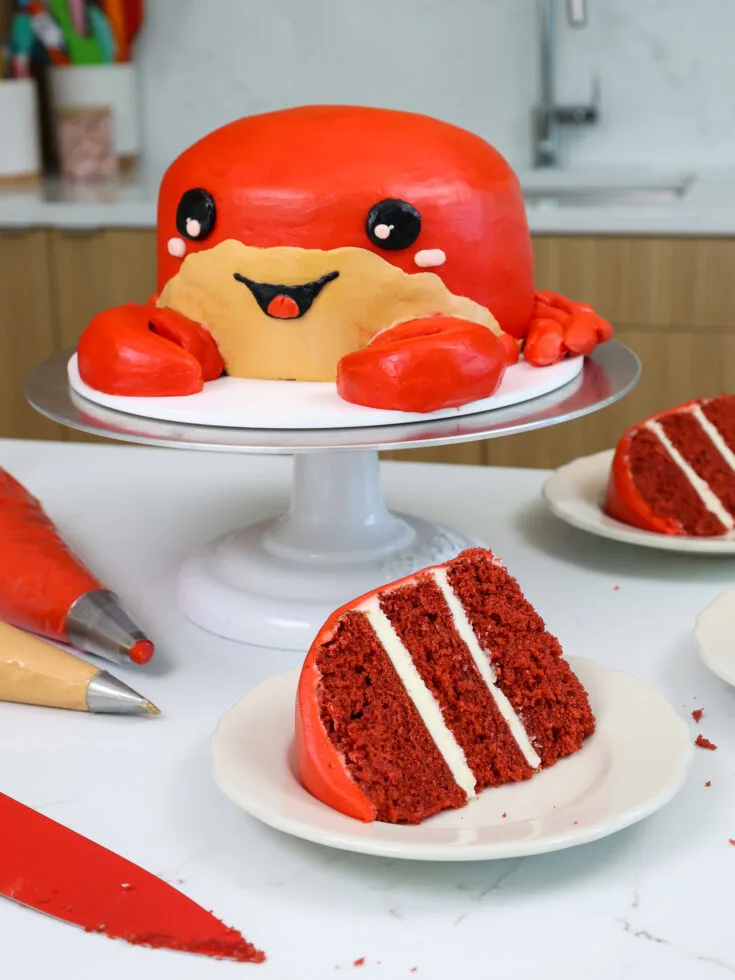
Learn how to make this adorable crab birthday cake! It's made with tender red velvet cake layers and decorated with buttercream frosting.
Ingredients
Red Velvet Cake
- 2 1/2 cups cake flour (300g)
- 2 Tbsp unsweetened cocoa powder (10g)
- 1 tsp baking soda (6g)
- 1/2 tsp fine salt (3g)
- 1/2 cup unsalted butter, room temperature (113g)
- 1 3/4 cups granulated sugar (350g)
- 2 large eggs, room temperature (112g)
- 1 1/4 cups buttermilk, room temperature (300g)
- 1/2 cup vegetable oil (120g)
- 2 tsp vanilla extract (8g)
- 1 tsp white vinegar (4g)
- 2 squirts of red gel food coloring (or 1 Tbsp liquid food coloring)
Buttercream Frosting
- 2 cups unsalted butter, room temperature (452g or 4 sticks)
- 1 Tbsp vanilla extract (12g)
- 1 tsp fine salt (6g)
- 7 cups powdered sugar (900g or a 2 lb. bag)
- 1/4 cup heavy cream or whipping cream (60g)
- small squirt of red gel food coloring (or 1 tsp liquid food coloring)
Additional Tools / Decorations
- 3, 7-inch Cake Pans
- Spinning Cake Stand
- 10-inch Cake Board
- Small Offset Spatula
- 3 Small Piping Bags
- 1 Large Piping Bag
- 1 Frosting Coupler
- 2 Small Round Piping Tips (like a Wilton 10)
- 1 Very Small Round Piping Tip (like a Wilton 2)
- Small Flat Piping Tip (like an Ateco 48)
- Large Round Piping Tip (like a Wilton 1A)
- Small Acetate Sheet (I cut these down into smaller squares with scissors)
- Electric hand mixer or stand mixer
Instructions
Red Velvet Cake
- Preheat oven to 350 F / 175 C. Grease three 8-inch or three 7-inch cake pans with homemade cake release or non-stick baking spray and parchment paper (I used 7-inch pans). Set aside.
- In a medium bowl, sift together 2 1/2 cups cake flour, 2 Tbsp cocoa powder, 1 tsp baking soda and 1/2 tsp salt. Set aside.
- In a large bowl or the bowl of a stand mixer, use either a hand mixer or a stand mixer fit with a whisk attachment to cream together 1/2 cup of butter and 1 3/4 cups granulated sugar. Mix on a medium high speed for 1-2 minutes until the mixture becomes lighter in color. Scrape the sides and bottom of the bowl as needed with a rubber spatula.
- Mix in 2 large eggs on a medium speed until fully combined.
- Add in 1 1/4 cups buttermilk, 1/2 cup oil, 2 tsp vanilla extract, 1 tsp white vinegar, and 2 squirts of red food coloring. Mix on a low speed until combined. The mixture might look broken at this stage but I promise it will come together once we add in the dry ingredients.
- Slowly mix the dry ingredients into the wet ingredients a low speed in two additions. Mix until just combined and you can no longer see any visible streaks of cake flour.
- Divide the batter evenly between the prepared pans. Bang the pans on your counter a few times to release any air bubbles that might be trapped in the batter. Bake for 27-30 minutes, or until a toothpick inserted in the center of the cake comes out with a few moist crumbs.
- Remove the pans from oven and let them cool for 10 minutes then run a small offset spatula around the perimeter. Carefully flip the layers out of their pans and place on a wire rack to finish cooling.
- Level two of the cake layers with a serrated knife once they're fully cooled. Leave one of the cake layers with a rounded top. Trim the top of the rounded cake layer to give it a domed shape like in the pictures above.
- Place the cake tops and cake trimmings in a bowl and cover with plastic wrap and set aside. We will use this later to make our crab's claws!
- If you're making these in advance, wrap and freeze them at this point.
Buttercream Frosting:
- Beat 2 cups of butter on a medium speed for 30 seconds with a paddle attachment until smooth.
- Add in 1 Tbsp vanilla and 1 tsp salt, and beat on low until the ingredients are fully incorporated.
- Slowly mix in 7 cups of powdered sugar and 1/4 cup of heavy cream on a low speed. Place a kitchen towel over your mixer to prevent powdered sugar clouds from coating your kitchen. Scrape the sides and bottom of the bowl as needed with a rubber spatula.
- If the frosting seems too thick, add in additional cream (1 Tbsp at a time). If the frosting is too thin, add in more powdered sugar (1/4 cup at a time). Wait to color the frosting until we've crumb coated the cake.
- Once the frosting reaches the desired consistency cover it with a piece of plastic wrap to prevent a crust from forming. Set aside.
Decorating this Crab Cake:
- Stack and frost the cake layers on a greaseproof cake board using a dab of frosting to help stick the first cake layer to the board. Stack the layers off-center so that you have room to add the crab's claws in front of the cake.
- Use one of the leveled cake layers first and spread an even layer of frosting on top of it. Add the other leveled cake layer next and add on an even layer of frosting. Top it with the rounded cake layer. Stacking the cake layers in this order should give our crab a nice, rounded shape.
- Chill the cake for about 10 minutes in the freezer. This will help the buttercream between the cake layers firm up and make the cake easier to frost.
- Spread a thin coat of frosting around the cake that fully covers the cake layers. Smooth using an offset spatula or small acetate sheet.
- Add a couple teaspoons of buttercream into the bowl with the cake tops we set aside earlier. Stir the mixture with a fork until the it's fully combined and has a consistency similar to cake pops. It should be easy to handle and shape.
- Use the cake top mixture shape 2 claws. Mine were about 1 1/2-inches wide and 2-inches long. Place them in front of the cake, then chill the cake in the fridge (20 minutes) or freezer (5 minutes) until the frosting is firm to the touch.
- While the cake chills, color the buttercream! It's going to sound crazy, but all the frosting can be colored in one bowl. We start with the lightest colors and work our way to the darkest, so it works out great!
- Scoop 1/2 cup of buttercream into a small bowl and make it a tan color with a small drop of yellow and brown gel food coloring to make our crab's tummy. Place in a small piping bag fit with a flat piping tip (like an Ateco 48) and set aside.
- Color 2 Tbsp of buttercream a light pink using a very small drop of red gel food coloring to make the cheeks and bright spots in our crab's eyes. Place in a small piping bag fit with a small round piping tip (like a Wilton 10) and set aside.
- Color 3 Tbsp of buttercream black using a very generous squirt of black gel food coloring. Place in a small piping bag fit with a coupler and round piping tip (like a Wilton 10) and set aside. This will be used to make the crab's eyes and mouth.
- Color the remaining buttercream red with red gel food coloring. Place in a large piping bag fit with a large round piping tip or cut with an opening about 3/4 inch wide and set aside. If you're struggling to make super red frosting, I share a bunch of helpful tips in my red buttercream tutorial.
- Cover the cake and claws in a thick layer of red buttercream. Make sure you save some buttercream to pipe our crab's legs later! Smooth using an offset spatula and acetate sheet and chill the cake until the frosting is firm to the touch.
- And then it's onto the piping! Pipe on the crab's underbelly first with the tan buttercream. Smooth using a small offset spatula or acetate sheet.
- Next, pipe on the crab's back legs using the red buttercream. Add four legs on each side of the cake behind the claws.
- Then it's time to sketch out our crab's face. Use an offset spatula or butter knife to trace out where the eyes, mouth, and cheeks should go.
- Use the black buttercream pipe on the crab's eyes and mouth. I used a Wilton 10 tip to pipe the crab's eyes, then switched the piping tip for a very small round tip (Wilton 2) to make the crab's mouth.
- The last step is to use the light pink buttercream to pipe on the crab's cheeks and the little spots in its eyes! This gives it a bit more dimension and makes it look even cuter. Then enjoy!
Notes
My Tips for Making the Best Crab Birthday Cake
- Ingredients at room temp mix together better! Set out any cold ingredients ahead of time.
- Properly measure your cake flour (spoon into the cup measure, then level). Or better yet, use a kitchen scale to measure your dry ingredients.
- Mix your cake batter just until the ingredients are incorporated once you've added in the flour. This will ensure your cake layers are tender and fluffy.
- Use a scale to weigh your cake pans as you fill them. Make sure each pan has the same amount of batter will make your cake layers bake to the same heigh and bake more evenly.
- Bang your cake pans on the counter before putting them in the oven. This brings any air bubbles that are trapped in the batter to the surface.
- Chill your cake layers in the freezer for about 20 minutes before assembling the cake. It makes it so much easier to stack and frost them!
Making this Crab Birthday Cake in Advance & Storage Tips
Make your cake layers in advance and freeze them. It breaks the process up and makes it more approachable.
Make your frosting ahead of time or save any leftover frosting! It can be stored in an airtight container in the fridge for up to a month.
This frosting can also be stored in the freezer for up to 3 months! Just be sure to give it a good stir once it thaws to make it nice and smooth again.
A frosted cake can last in the fridge for a week, or in the freezer for a month. The buttercream locks in the moisture and keeps the cake fresh and delicious!
Nutrition Information
Yield
20Serving Size
1Amount Per Serving Calories 604Total Fat 33gSaturated Fat 16gTrans Fat 0gUnsaturated Fat 15gCholesterol 93mgSodium 306mgCarbohydrates 76gFiber 0gSugar 60gProtein 3g
